- Home
- Mark Chadbourn
The Hounds of Avalon tda-3 Page 12
The Hounds of Avalon tda-3 Read online
Page 12
Before Hunter could ask what was wrong, he heard the crunch of footsteps in the snow behind him. He turned to see Samantha, buried in a massive fur-trimmed parka, her arms wrapped across her chest. She paused uncomfortably before him.
‘You look even more gorgeous than usual in that,’ Hunter said. It wasn’t a line: the oversize parka made her features more fragile and beautiful and emphasised the intelligence in her pale eyes.
Hunter expected to feel the sharpness of her tongue, but all she said was, ‘I heard what was happening.’
‘You can’t keep anything a secret around here.’
Samantha visibly steeled herself, then grabbed Hunter’s head and planted her lips on his. They felt full and hot, and he was suddenly aware of a depth of emotion coming up through her skin like the heat from a fire. When she broke off, she stared deeply into his eyes for the briefest moment, but it was enough to underline everything he had sensed in her kiss.
‘You’d better come back, Hunter.’ She spun round and marched away towards the buildings.
For the first time in his life, Hunter was lost for words.
‘She didn’t even know I was here,’ Hal said, but Hunter was distracted by the jumbled thoughts rolling through his mind as he watched Samantha’s form become obscured by the swirling snow.
‘Bloody hell. I think she likes me,’ he said, amazed.
The choppers’ engines fired up one after another, the whirling blades raising a snowstorm around them. Hunter ducked down, covering his face with one arm, and clapped Hal on the shoulder; his friend appeared dazed.
‘Don’t worry, mate. How can I not come back after that?’ Hal stared at him, troubled and distracted. ‘Don’t worry, I’m not going to hug you.’
‘Take care, Hunter.’ Hal forced a smile, then ran for the cover of the college buildings.
Hunter hurried, keeping low, to climb into the second chopper, his heart racing. He felt strangely out of sorts, excited yet unsettled by the discovery of some so far unconsidered part of himself. As the chopper rose on the unsteady currents, he stared down at the snow-swept field, then at Magdalen as it dropped away below him and finally at the disappearing city. He could still taste her on his lips.
Chapter Six
The politics of War
‘ It can only be done by blood and iron.’
Otto von Bismarck
The army had dug in along a ridge of hills south-east of Moffat in the Scottish Borders, but they were barely prepared for the near-arctic conditions. The ground was as hard as iron, frozen to a depth of at least twelve inches underfoot, and the wind that blew from the north felt harsh enough to take the skin from their faces. Overnight the temperature plummeted to minus ten, worse with the wind-chill factor.
‘Bloody hell, Hunter. This is a nightmare.’ Clevis stamped his feet and clapped his hands as he circled the campfire, little more than the tip of his broken nose visible in the depths of his hood.
Hunter looked out over the tent city and the constellation of campfires spread across the hillsides, each one trailing a thick line of black smoke up to the colour-leached dawn sky. ‘You know what I’m thinking? This is a new Ice Age.’
‘It’s not bloody fair. We’d barely got over the Fall when the plague came along. And now this.’ Clevis sounded petulant, but he was barely seventeen, hardly trained, emotionally immature. And Hunter had to take him on a potential suicide mission. Clevis shouldn’t have been there at all, but with forces so badly depleted they had to make do in many different areas, even if that meant sending a barely trained youth on a Special Forces operation. They needed the numbers to make the plan work and Hunter just had to hope that the others would cover for the lad. Clevis really didn’t know how unfair it was, but Hunter did, and that knowledge troubled him deeply. He liked Clevis; for all his faults, the boy was decent-hearted and truly believed in the cause for which he was fighting.
As Hunter surveyed the snowy wastes stretching away towards the sooty streak of black on the horizon that signified the enemy’s location, he realised that Clevis was staring at him. ‘I’ve told you not to do that.’
‘Sorry.’ Clevis wiped the back of his hand across his dripping nose. ‘It’s just, I was thinking-’
‘Well, don’t.’
‘How many men have you killed, Captain?’
One hundred and sixty seven.
‘I can’t remember.’
Every face locked in place, eye colour, hair colour, method of dispatch.
‘It’s a dirty business, Clevis, but we do it so other people don’t have to.’
He would never forget any of them.
‘What’s it like?’ Clevis asked hesitantly. ‘I mean, when you actually… do it?’
‘Stop asking impertinent questions. We’ve got a job to do.’ He prayed that Clevis could escape any killing. The act was like a worm in an apple, getting fatter by the day with each mouthful it devoured. Nobody was immune. Hunter consoled himself with the knowledge that Clevis would probably be dead before he had the chance to raise his weapon.
‘We begin Operation Clear Skies at oh-seven-hundred hours.’ The General rested his two meaty fists on the trestle table in the conference tent and surveyed Hunter’s team. ‘By that time, you will be deep in the heart of enemy territory. Your mission is to cause as much disruption to the enemy’s lines as possible. Chaos and confusion are the order of the day. Let them know we are not weak. That we are not going to roll over and die. By the end of this day, I want them reconsidering their decision to invade.’
Hunter cast a surreptitious glance across his team. Apart from Clevis, there were four others, all hard men, all aware of what potentially lay ahead for them. Bradley was from Kent, a scar running down his left cheek like an exclamation mark, the result of an Iraqi bayonet. Next to him, Coop was slight but more focused than anyone Hunter knew; he was from Birmingham, but with strong Jamaican roots. Spencer was a hard man, and silent, Ormston a sneaky little shit who was surprisingly reliable in a crisis, both of them from some Godforsaken industrial town or other in the north. They rarely spoke about their pasts; the present, for all its misery, was clearly so much more appetising.
It was Ormston who raised his hand to speak first. ‘Excuse me, sir, but do you have any idea what might be waiting for us over the hill? I heard there was a film-?’
‘Very poor quality. You wouldn’t learn anything from it that would help you,’ the General lied. Even Hunter hadn’t seen the video, but he knew exactly why it was being kept from them: no one would venture over that hill if they knew what horrors were waiting for them. But wasn’t that the case in any war?
‘The frontal assault will give them hell,’ the General said. ‘You have my word on that. We’re throwing everything at them, every weapon at our disposal apart from nukes.’ He hesitated; such weapons were clearly still an option for another time. ‘The strategy is for massive shock, devastate their forces within the first twenty-four hours.’
Hunter fought the urge to smile. If wishes were fishes they’d need a sea of batter.
‘God be with you,’ the General said. ‘Go into the fray with good heart. It is a just fight, for the future of our country and our people.’
The General nodded and Hunter led his men out. They made their way in silence across the camp site until Bradley stopped suddenly and exclaimed, ‘Bleedin’ ’ell. Look at that.’
The sky behind them was black. At first, Hunter thought it was a whirlwind of dust, but as it drew closer he could see irregular edges and rapid movement within the body of the darkness.
‘Birds,’ Spencer said flatly.
‘Crows.’ Coop looked at the approaching cloud uneasily.
‘Now that ain’t natural,’ Bradley said in hushed tones.
The crows’ actions became even more unnatural as they neared. Initially, their cawing was discordant in the early morning peace, but gradually they fell eerily silent. They descended in a wild flapping cloud over the hillside behind the camp, sett
ling on trees, hedges, fences, filling the fields so that the snow was obscured by an oily blackness; it looked to Hunter like some horrible pollution was running down the slope towards them.
Once they had landed, the crows fell still. It looked to all the men as though the birds were watching the camp with their gleaming eyes, waiting. Hunter knew the symbolism and wasn’t about to say anything, but Coop spoke up. ‘They used to say that crows gathered before battles, waiting to feed on the dead, as if they knew exactly what was going to happen.’
‘Yeah, but look how many of them there are!’ Ormston said. ‘They must be expecting a right bloody feast!’ He laughed loudly at what he thought was a great joke, but he was the only one and eventually his humour drained away until there was only the soft whisper of the wind across the snow; and the men watching the crows; and the crows watching the men.
The chopper swung in low over the snowy wastes before hovering over the dust-off point. Hunter and the rest jumped the remaining six feet into the heart of the blizzard raised by the whirling blades. They were already under the cover of nearby trees as the deafening drone of the helicopter receded behind them.
Polar fatigues helped them blend in as they moved swiftly and silently along the hedge lines to a deserted farmhouse overlooking the enemy encampment. Hunter made his way quickly to a bedroom that still smelled of its former occupants and found a window that allowed him the best view with the hi-res binoculars. But he only needed his eyes to learn the true meaning of ‘encampment’. The enemy filled an entire valley, lining the floor and the hillsides for a good ten miles, packed so closely that not a single square of white was visible. The scene was unspeakably eerie, for there was none of the back-and-forth movement that Hunter would have expected in a camp; the enemy stood stock-still to a man, resembling a Chinese terracotta army, all facing the direction where the Government troops were preparing for the attack. The chilling scene suggested that the enemy were machines that did not need to move or talk or eat or feel any emotion; they were simply waiting for the moment when they would be unleashed to crush anything in their path.
Clevis slipped in next to Hunter and froze the moment he looked out of the window. ‘Jesus Christ. We don’t stand a chance.’
Hunter used the binoculars to get a better look at the enemy. The ranks comprised many different types, many different species: tall, willowy men stood next to squat, brutish troglodytes; things with a hint of the reptilian next to others that were almost as insubstantial as ghosts. But all of them looked as if they had died and been remade: weapons had been embedded into their bodies, swords emerging from forearms, nests of spears protruding from ribcages, exposed bone visible everywhere. And there was an odd purple mist drifting from their eyes and mouths. Even more disturbingly, some of the enemy were human. They looked very much as though they might once have been the residents of the area, now transformed like all the others.
Hunter could feel Clevis shaking next to him. Without looking, Hunter said, ‘On the positive side, I can only see swords and… pikes? A few axes, spears…’
‘See?’ Ormston brayed. ‘ They don’t stand a chance.’
Hunter pushed past them to carry out a weapons check and prep them for what was to come. They had small arms and SA80s, but their most effective response was the small but devastating plasma explosives they carried in their backpacks. Each one would take out fifty of the enemy at least — a drop in the ocean compared to the thousands that lined the valley, but if the explosives were used effectively they could make their mark.
Coop took out his cross and chain and kissed it before slipping it back into his parka. The rest of them looked to Hunter, still and silent with their thoughts. He checked out of the window one more time, then gave the nod.
Ground zero was hell. Shells rained in from the distant batteries with barely a second between each explosion. Thick black smoke mingled with the strange purple mist, blasting back and forth in huge, billowing clouds. The noise was as deafening as a foundry and the ground vibrated as if a permanent earthquake ripped through the strata. Body parts flew everywhere.
The detailed briefing had told Hunter and his team exactly where the shells would fall. Their safe route was prescribed through thick tree cover, but they were still close enough to the carnage to view the sea of arms, legs and heads spread out across the fields. Earplugs protected them from the worst of the noise, but it still felt as if their heads were full of a swarm of bees; Hunter gave his orders via previously arranged hand signals. Occasionally, they would lose sight of each other in the sweeping smoke, and at those times it felt as though they were already dead, walking through some eerie purgatory towards judgment.
Hunter’s mind had the calm of a pool at twilight. He existed wholly in the moment, seeing, hearing, reacting, but not feeling. In that state, he gave himself up to the shadow-figure that rode the mare of his conscious mind, the true Hunter who had made him so good at being fearless, emotionless, inhuman in battle. The Hunter he hated.
The trees and the snow and the mist reminded him of the hills of Bosnia, the stink of the mass graves heavy in the air as he hunted Serb mercenaries. The thunder of the shells was Baghdad all over again, slipping in and out of the shadows of the sun-baked souk.
How had he ever got into it? He’d wanted to be a zoologist. Animals, that’s what he lived for, endlessly fascinating, nature’s little wonders, from the aphid to the zebra and all points in between. There wasn’t a single wrong turn he could identify; it was the cumulation of a thousand tiny steps, each one insignificant in and of itself but all leading him away from the magic path into the deep, dark forest. To this place, where body parts crunched underfoot.
He led the way through the trees into a culvert under a road, then along the path of a trickling brook to a point where a sword of thick forest plunged deep into the heart of the enemy forces. With skill, they could move through the trees unseen, releasing their explosives into the midst of the opposition.
Their hot breath turned the air white as they gathered in the dense vegetation beneath the shadows of the branches. Hunter checked his watch: nearly time. The fields ran away from the forest down a slope to a road winding along the valley bottom. When the smoke and purple mist cleared in a gust of wind channelled along the cut, Hunter saw the enemy still standing, their ranks now mottled by circular blast marks. He could feel the unspoken questions radiating from the men around him: Why don’t they run? Why don’t they attack? Why are they waiting to die?
Hunter looked at his watch again and then signalled to the others. Quickly donning masks attached to portable oxygen canisters, they dropped low. Though they were beyond the estimated blast area, they still had to be cautious.
The shelling stopped. In the disturbing silence that followed, Hunter’s ears still rang, but he removed his plugs to listen for the drone of the approaching jet. It was a Tornado GR4, one of the few they still had left after Newcastle. When it was overhead, Hunter shielded his eyes.
The fuel/air explosive was detonated fifty feet above the valley. Those immediately beneath the blast were vaporised instantly, others nearby seared by the tremendous heat. Hunter and his team were far enough away that the shock wave didn’t burst their eardrums or rupture their lungs. The oxygen was sucked out of the air in the immediate vicinity of the explosion, which would have been devastating for human troops, but Hunter doubted its effectiveness on this enemy. He was proved right when the thermal winds cleared and he looked up. On the periphery of the blast zone, the enemy still stood, waiting, but there was now a massive hole in the heart of the force where flames raged out of control.
Clevis and Ormston high-fived before restraining themselves, but Bradley, Spencer and Coop were already coolly removing the explosives from their knapsacks. Equipped with what were essentially hi-tech catapults for launching the plasma bombs, they moved like ghosts through the trees. One after the other, they emerged to fire and then retreated back into the forest depths before they were seen.
<
br /> Scores of the enemy fell with each blast. There was none of the panic and chaos that the General had hoped to engender, but at least they were cutting swathes out of the enemy lines.
The team continued with the guerrilla attacks for ten full minutes, but as the blast from one of Clevis’s launches died away, Hunter saw that a change had taken place. The enemy were moving — but not slowly, not like robots coming alive in some fifties science fiction movie. In the blink of an eye, they were suddenly in rapid motion up the other side of the valley, weapons ready, but still eerily silent.
Hunter was convinced that he and his men had not been seen, but some of the enemy had now turned to the trees where they were hiding. He had the creepy feeling that the enemy didn’t need to see, that they had abilities far beyond anything anyone had imagined.
‘There’s something back here — in the trees.’ Coop’s voice had the first faint tremors of uneasiness.
There was no time to respond: the enemy moved forward too quickly. Hunter faced an attacker resembling some over-muscled barbarian from a Schwarzenegger film, naked to the waist where a blood-stained animal fur hung. He wore a twin-horned Viking helmet on top of a matted mane of red hair and a long fiery beard. Half of his face was exposed skull, and more bone could be seen protruding from his meaty forearms and muscular thighs. Both hands were welded together around an enormous broadsword, bone and flesh merging directly into the metal. Purple mist streamed from his eyes and mouth, as if a fire raged within him.
The closer the barbarian got, the more Hunter felt despair welling up inside him. He realised instinctively that it was another weapon, subtly inflicting psychological damage. And it was effective: he had to fight hard to stop himself giving in to its damp pull.
Hunter switched to his SA80. The bullets cut a swathe across the attacker’s torso, but didn’t slow him for even an instant. The barbarian’s shadow engulfed him, and then the broadsword came crashing down. Hunter had a second to grip the gun with both hands and hold it ahead of him to block the sword. He knew it was futile, but although the gun shattered, it did just enough to deflect the sword from splitting his skull in two.

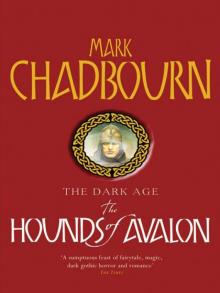 The Hounds of Avalon tda-3
The Hounds of Avalon tda-3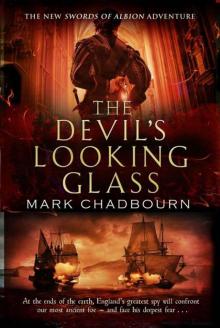 The Devil's Looking-Glass soa-3
The Devil's Looking-Glass soa-3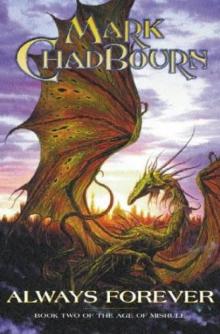 Always Forever taom-3
Always Forever taom-3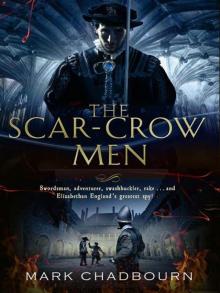 The Scar-Crow Men
The Scar-Crow Men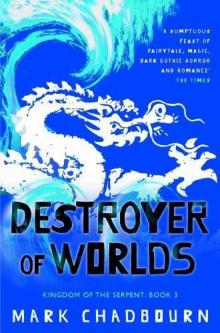 Destroyer of Worlds kots-3
Destroyer of Worlds kots-3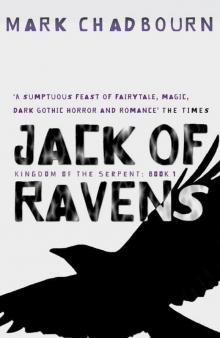 Jack of Ravens kots-1
Jack of Ravens kots-1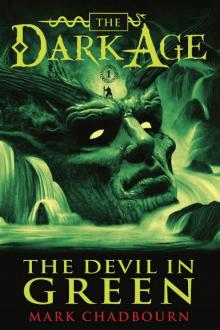 The Devil in Green
The Devil in Green World's End
World's End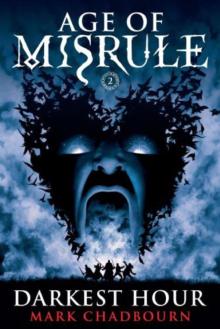 Darkest Hour (Age of Misrule, Book 2)
Darkest Hour (Age of Misrule, Book 2) Destroyer of Worlds
Destroyer of Worlds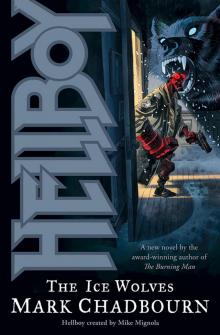 The Ice Wolves
The Ice Wolves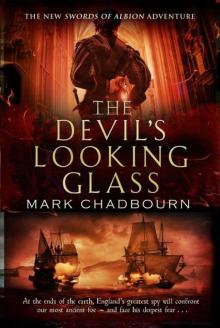 The Devil soa-3
The Devil soa-3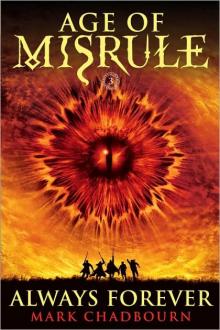 Always Forever
Always Forever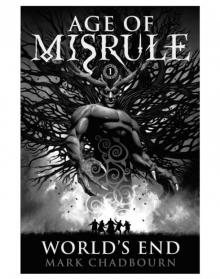 World's End (Age of Misrule, Book 1)
World's End (Age of Misrule, Book 1)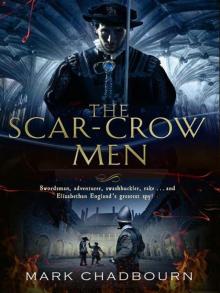 The Scar-Crow Men soa-2
The Scar-Crow Men soa-2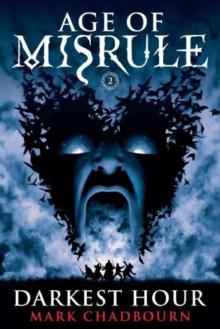 Darkest hour aom-2
Darkest hour aom-2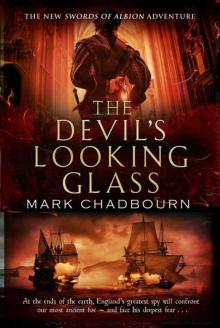 The Devil's Looking-Glass
The Devil's Looking-Glass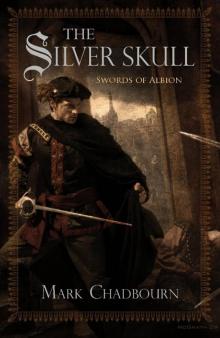 The Silver Skull
The Silver Skull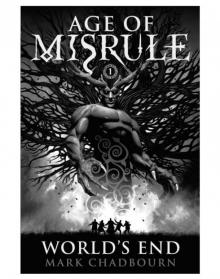 World's end taom-1
World's end taom-1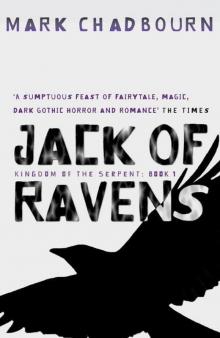 Jack of Ravens
Jack of Ravens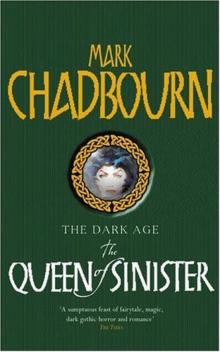 The Queen of Sinister
The Queen of Sinister